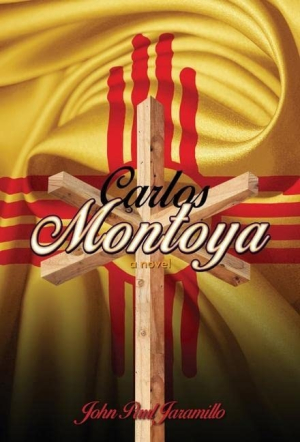Carlos Montoya
An introspective patriarch visits his flaws upon his family in the musing, multigenerational novel Carlos Montoya.
In John Paul Jaramillo’s epic novel Carlos Montoya, an ailing patriarch reflects on his past, even as his family works to recover from their generational traumas.
Carlos enlisted in World War I not out of a sense of duty, but to find his cousin. This deep drive to find his family continues to torment Carlos throughout the rest of his life. He settles in New Mexico and then Colorado; his family blossoms and then splinters. He fights with his passionate younger wife, whom he also loves deeply. And he proves to be an imperfect parent.
Later, Carlos’s daughter ventures far from home, finding a flawed partner of her own. Indeed, each generation of Carlos’s family feels broken in spirit while also trying to learn from the examples of their predecessors, approaching their own challenges in different ways. No matter their individual methods of coping, Carlos still haunts each of his descendants. And as he ages, Carlos retreats within himself, reliving the years he spent chasing the idea of family.
The narrative’s progression mirrors Carlos’s mental decline: its timeline is erratic; its flashbacks are frequent. Carlos is in his seventies when it starts, but each subsequent chapter takes place at a different point in time, making for a muddled progression. The audience has to rely on context clues to track its forward movement, though these are often quite subtle.
Carlos is prone to introspection and solitude; his memories assume poetic qualities that spill into his early conversations. The story is at its most focused when it’s looking outward, as when it’s detailing the years leading up to Carlos’s marriage and the births of his children. Herein, the language shifts, becoming more modern and inviting than it was in the book’s beginning.
Still, Carlos is a prickly protagonist who becomes combative, and sometimes terse, as he ages. Those who know him well often pronounce that he is difficult to love; he bemoans the myriad ways in which the world lied to him and overemphasizes his broken spirit, overshadowing other elements of his development. As Carlos struggles to reconcile himself to his flaws, the novel loses its center amid his family members’ declarations that there’s a good man trapped within him. The book’s pages may span generations, but they’re most concerned with establishing Carlos as his family’s anchor—and pushing him toward the promise of a happy ending, though such a conclusion seems increasingly improbable.
Carlos Montoya is a multigenerational novel in which a stubborn patriarch’s family works to pull itself together despite the troubles of its past.
Reviewed by
John M. Murray
Disclosure: This article is not an endorsement, but a review. The publisher of this book provided free copies of the book and paid a small fee to have their book reviewed by a professional reviewer. Foreword Reviews and Clarion Reviews make no guarantee that the publisher will receive a positive review. Foreword Magazine, Inc. is disclosing this in accordance with the Federal Trade Commission’s 16 CFR, Part 255.

